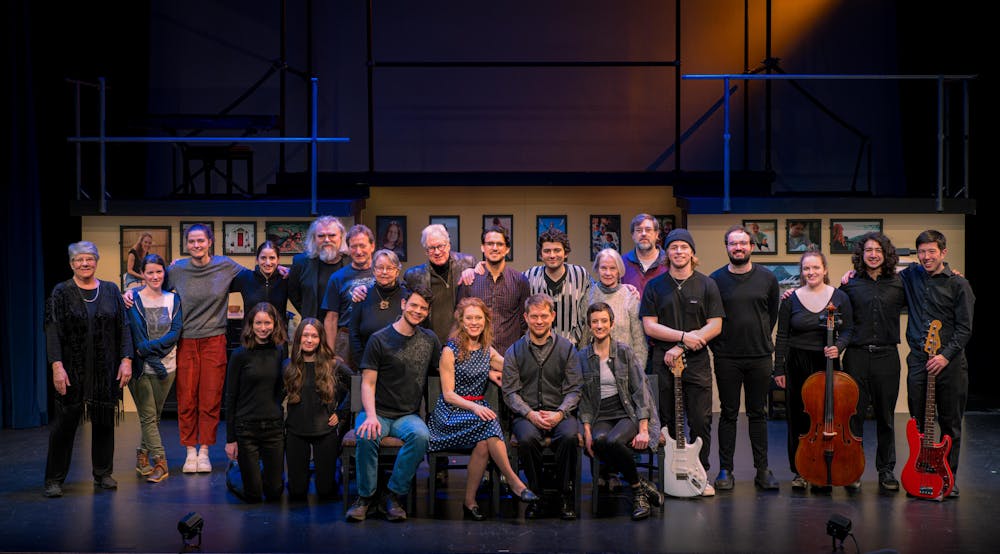Walking into the Town Hall Theater for the opening night of “Next to Normal,” the sixteenth J-Term musical that ran from Jan. 25–28, everything seemed normal. In the lobby, a virtual tour of the theater’s forthcoming renovations drew curiosity. The crowd gathered and chatted before the performance began. They looked on curiously at the softly-lit stage, trying to make sense of what appeared to be just another family living room.
Against the yellow walls hung portraits, which offered brief flashes of the family whose story was about to be unveiled: sunny smiles and a vacation to the beach, a couple kissing in front of snow-capped mountains, a mother lovingly holding a child. Everything appeared normal — and then the show began.
A gut-wrenching and emotionally powerful musical that debuted on the Broadway stage in 2009, “Next to Normal” follows the life of Diana, who lives with bipolar disorder and psychosis, and her family as they struggle to find a path toward healing.
From the first song, it was possible to see the faults behind the pristine portraits on the walls. Diana’s mood swings cause her to lose control. Dan, her tired but loving husband, tries to repress both of their emotions, while Natalie, their teenage daughter, falls through the cracks of this mess; and Gabe, the shadow of an unresolved grief-ghost, haunts the household, luring them into old paths of hurt. The musical is a challenging story about a family falling apart.
The cast — a mix of Middlebury students, alumni and professional actors working in Vermont — delivered a tour de force performance highlighted by skilled, emotional vocals. Because the show was not sponsored by the college music department this year, it relied on fewer current students than in past J-Term productions. It was the cast’s sensibility, talent and passion that created a beautiful picture of suffering, and guided the audience through Diana’s traumatic ordeals with psychiatric offices, electroconvulsive therapy and drug abuse until the hopeful possibility of reinvention came alive on stage.
If portrayals of those living through mental health issues can be reductive, Elisa Van Duyne’s human attention to the depths of Diana honored the character’s pain with a profound rendition of that lived experience. Her acting, attentively crafted down to the expressiveness of her apathetic eyes at a psychiatrist’s office, paired with the strength of her voice belting for help and understanding, composed a complex character without resorting to caricature.
Caitlin Sausville’s Natalie captured with wit and angst the frenzy of a turmoiled teenager trying to stay afloat as the world falls apart while resisting becoming like her mother. Sausville’s delivery touched on what it feels to be invisible and desiring to be seen — a driving force in the plot’s conflict. Her boyfriend Henry, played by Michael Koutelos ’21, infused her life with romance and lyricism, while both carefully navigated the tension of falling prey to the same patterns that challenged the adult couple’s marriage.
Koutelos, for whom “Next to Normal” is his sixth J-Term musical since he was a first year at Middlebury, offered a softer, more lyrical take on Henry, making for a charming counterpoint to the otherwise dense characters with whom he shared the stage.
Even when technical difficulties arose, the ensemble held strong and marveled the audience with their performance. Andrew Ritter’s vocals added depth to his rendition of Dan, the all-American dad struggling to make sense of his wife’s condition and his role as a caregiver in the family. When Jonathan Mount ’25.5’s microphone failed during the opening show, his strong voice and magnetism echoed through the hall, adding to the gravity of the scenes in which his character, Gabe, haunted Diana into facing her emotions.
The all-student orchestra led by Ronnie Romano ’20 serenaded the audience with a shifting musical landscape that ranged from traditionally sounding musical numbers to guitar-heavy rock interludes. The musical combines elements of opera and rock, alternating moods to match those of the protagonists.
At intermission, Romano told The Campus what made the music so emotional. “The music is really creative. I’m impressed with how the orchestration switches between rock band and lush, almost orchestral style. It adds a lot. You really just get dragged along,” he said.
Remarkably, several cast members were Middlebury College alumni or were returning to Vermont after spending time elsewhere. According to the show’s program, Van Dyne and Ritter both moved to Middlebury to support their families.
Koutelos told The Campus that he is excited to attend the Ohio Light Opera Company this summer, one of the country’s premier lyric theater festivals, and that he hopes to continue his tradition of sharing the Middlebury stage come next winter.
Telling the story of Diana and her family with passion and attention to craft was precisely what motivated Town Hall Theater Artistic Director Doug Anderson to stage the production. In a video made available on the Theater’s YouTube page, Anderson noted that “great art happens when people take risks.”
An emotional tear-jerker about perseverance and the challenges of renewing oneself, “Next to Normal” delivered on its promise to honor pain with song while inviting its audience to reconsider the meaning of being normal. To risk sharing a powerful story about mental health and uplifting narratives of struggle showcases the Town Hall Theater’s commitment not only to art, but to being an agent for community and social change.




